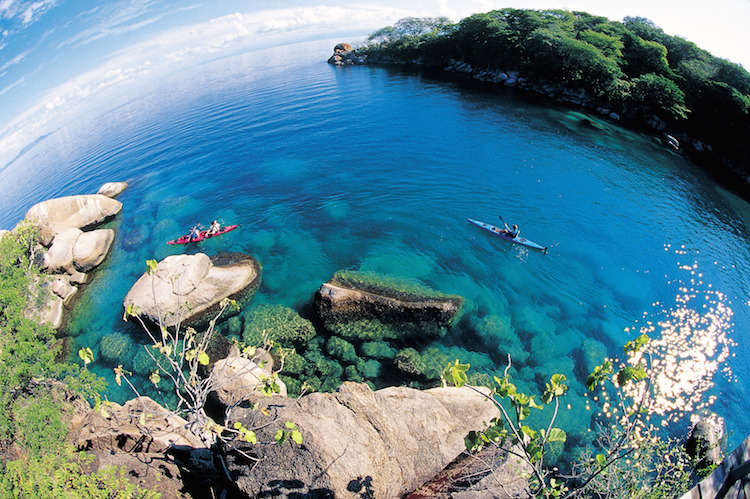Meghan Black is just back from Malawi. She shares how this often-overlooked African country is poised to step into the spotlight, and why you should go before everyone catches on.
I am on a remote lava rock island, staring straight through the turquoise waters to the sandy bottom of Lake Malawi, watching a school of cichlids play tag. Later, I will grab a mask and snorkel in the hopes of witnessing a mass of baby cichlids burst from their mother’s mouth. Considering there is not another soul around to scare them away, my chances are high. In a continent where the “cluster effect”—that unappealing practice of five safari vehicles surrounding a wildlife sighting—is sometimes unavoidable, I feel I have unexpectedly found the buried gem.
For two weeks Malawi continued to surprise me, here are my top reasons why:
1. An undercover photographer’s landscape

Google or Pinterest “Malawi” and you may be slightly underwhelmed by the catalogue of beautiful shots. After being on the ground in Malawi, this shocks me. There are rolling green valleys banked by dramatic cliffs; plateaus floating in the sky with rushing waterfalls; lush tea plantations dotted with acacia trees; picturesque rivers covered with flowering lily pads and purple water hyacinths where herds of elephants come to drink; blue skies that go on for miles and painterly sunsets that reflect in still pools; and, the star of the show, Lake Malawi with its impossibly clear waters and more shades of blue and turquoise than I knew existed, set off by jade islands and mountains on the horizon. Irresistible.
2. Rare wildlife: cichlids & black rhino

Lake Malawi is one of only two places in the world where cichlids can be found. These brightly colored freshwater fish have a very unique parenting tactic. If you have not seen the phenomenal Lake Malawi cichlid moment in BBC’s Planet Earth, watch it here. Whether or not you are a snorkel or dive fanatic, this display will not disappoint.
Malawi is also one of the few places where black rhino can still be seen in the wild. Poaching has nearly wiped-out this species across Africa. But a black rhino conservation program is working tirelessly to protect the wild population in Malawi’s Liwonde Nature Reserve. Go during the dry season for black rhino tracking on foot.
3. A national secret handshake

“Local hospitality” is liberally used in the world of travel. However, Malawi is one place that does it justice. Expect to be welcomed by some of the broadest, most genuine smiles you have ever encountered. You will quickly learn the local greeting: lock thumbs as you say “how are you,” then shake as you reply “I am good”—a national secret handshake! How could this not make you feel good?
Malawians are peaceful people. Confrontation, violence, and theft are socially alienating acts and rarely occur. Malawi is calm, stable and inviting despite being ranked as the number one poorest country in the world by The World Bank. This is truly a testament to the strength of the people.
4. Seriously un-touristed

About three days into my two week trip, it suddenly struck me that something was curiously absent: I had yet to cross paths with another group of foreign travelers. This sense of being alone in the wild is a rare treat to be savored. Malawi is coming into its own with a new crop of original, beautiful lodges popping-up on private islands and along river edges deep in the bush. The next year or so is the sweet spot for getting these places all to yourself.
5. The sandwich

Malawi’s borders touch three equally spectacular destinations: Zambia, Tanzania, and Mozambique. With well-maintained roads and charter flights to multiple destinations in each country, travelers can easily combine a trip to Malawi with one, or all of its neighbors. Many choose to take advantage of Zambia’s prolific wildlife before hoping over to Malawi for a one-of-kind experience on the lake.
Get in touch to learn more about a custom journey to Malawi.
This post was originally published on Absolute Travel



